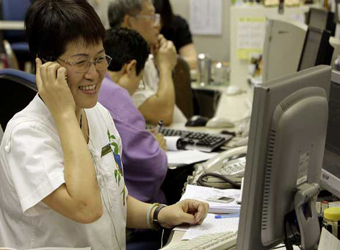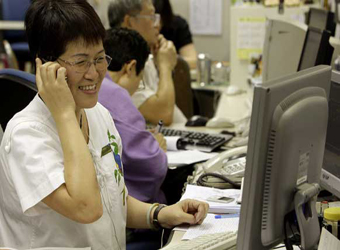Japan’s Nikkei 225 advanced 1.82 percent and the Topix gained 1.38 percent, amid broad-based gains. The Topix subindexes for banking, real estate and pharmaceuticals stocks were among the top-performers, while steelmakers traded lower.
Meanwhile, the Kospi tacked on 1.55 percent, driven by gains in the tech sector as heavyweight Samsung Electronics surged 4.82 percent. The tech giant is due to release its first-quarter earnings guidance on Friday.
Shipbuilders also traded higher, while automakers slipped.
In Australia, the S&P/ASX 200 edged higher by 0.64 percent, with the heavily weighted financials subindex rising 1.14 percent. Despite the broader gains on the index, the materials sector slipped 0.2 percent. Mining majors traded lower, with Rio Tinto sliding 1.19 percent.
Gains were also seen elsewhere in the region, with Singapore’s Straits Times Index higher by 1.84 percent. MSCI’s broad index of shares in Asia Pacific excluding Japan was up 0.67 percent by 12:51 p.m. HK/SIN.
The improved confidence among investors in the region came after the sharp gains posted by U.S. stocks as initial fears about escalating trade tensions faded.
Hong Kong, China and Taiwan markets were closed for the Ching Ming Festival on Thursday.
Worries over trade rhetoric, which ramped up after China unveiled plans for additional tariffs on 106 U.S. products, waned after overtures were made regarding potential negotiation between the two countries.
Major U.S. stock averages finished higher on Wednesday after sliding earlier in the session. The Dow Jones industrial average rose 0.96 percent, or 230.94 points, to close at 24,264.30 — a bounce of more than 700 points from its session low.
“The relief is that neither party has pulled the trigger on tariffs,” Vishnu Varathan, head of economics and strategy at Mizuho Bank, said in a note about the newly announced product duties.
Meanwhile, investors were hopeful that talks between the U.S. and China could mean a potential trade war would eventually be averted. China’s ambassador to the U.S. said that negotiation remained China’s “preference” following his meeting with acting U.S. Secretary of State John Sullivan on Wednesday, Reuters reported.
“No date has been set for the proposed tariffs put forward by China or the U.S., meaning we could see uncertainty continue for the next couple of months. This also means negotiation is still firmly on the table,” ANZ analysts said in a morning note.
The juxtaposition between the ongoing U.S.-China tit-for-tat and hopes for trade talks is likely to remain in focus among investors.
“Our base case … remains that negotiation and de-escalation will be the likely endgame. Having said that, China’s proportionate response has increased the risks of further escalation in ‘rhetoric’ in the coming weeks,” said Morgan Stanley analysts in a note.
The improvement in sentiment saw gold prices ease from the one-week highs touched overnight. Spot gold was last down 0.33 percent at $1,328.21 per ounce.
European stocks had come under pressure in the last session following China’s announcement of those trade measures.
The additional tariffs announced by China on Wednesday came less than a day after the U.S. unveiled the list of Chinese imports, including high-tech products, that could be targeted in response to what the White House deems an unfair trade relationship.
The dollar extended gains against the safe-haven yen following Wall Street’s overnight rebound, trading at 106.97 by 12:20 p.m. HK/SIN. That compared to levels around the 105 handle seen at the beginning of the week.
Meanwhile, the dollar index, which tracks the U.S. currency against six peers, was steady at 90.142.
Source: CNBC


